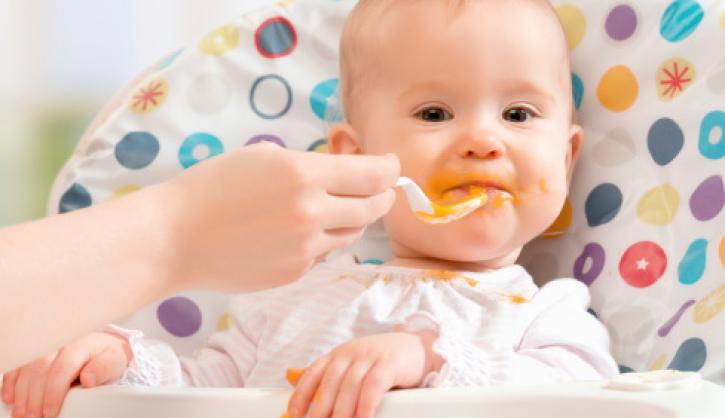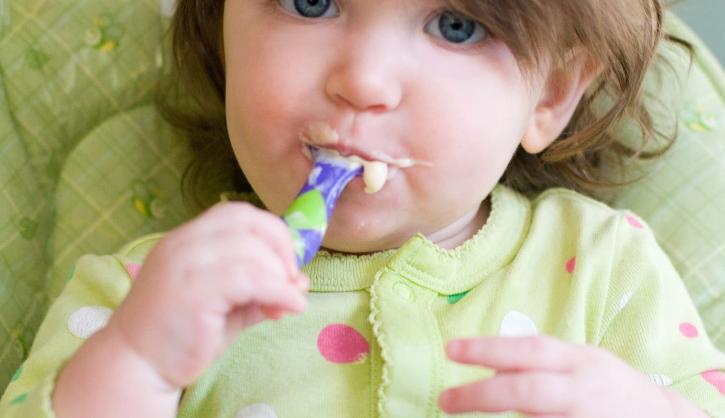Why is weaning your baby so important, and what do you need to know?
With the gradual introduction of ‘solid’ foods from 6 months, your baby begins the journey of learning to eat a varied and healthy diet. The breast milk or infant formula that has been their sole source of nutrition up until this point will no longer be sufficient in meeting their nutritional needs, so solid foods also need to be introduced into their diet. Eventually they will get all the nutrients they need from the foods they eat and no longer need breastmilk or infant formula. Once solids are introduced your child will discover a whole world of new flavours and textures, as well as developing new skills that are important for their development. Here are some guidelines for making this crucial stage in their development a success.
When your baby realises that eating means asserting their personality
The very first spoonful of carrot puree or mouthful of cereal represents a remarkable milestone and change for your baby: they have now begun weaning. Baby milk, whether breast milk or formula, has so far provided them with everything they need, but now there’s a whole new world of taste to explore. Thanks to all these new flavours and textures, your baby realises little by little that they have the power to make decisions, such as "I like it" / "I don't like it", and that they have a personality.
What’s more, the foods they like now as a baby, will often translate into adult preferences. This means that the introduction of solids is also an important stage in the development of their independence. Meal times also represent a new experience for your baby. They move from a passive role to become an active player, and can also start interacting with those around them. Weaning babies aren’t just eating for nutrition; they’re exploring their world and finding their place within it.
The first spoonful
Your baby’s first spoonful of food is a precious moment, and we know you want to prepare it carefully and make it a special occasion. Buy a special spoon, made of plastic (not metal) for a softer feel, and sit your baby’s high chair next to the table, giving them a place with the family for the first time. Don't forget to take a photo. Remember that this is a new skill for your baby, so the process may take time.
Weaning your baby won’t happen instantly, but nor should it as they will still need 500-600ml of milk up to the end of the first year.
When you begin weaning them, your baby might just suck on the spoon but this in itself is a success.
Some babies refuse the spoon at first. If your baby clamps their mouth shut and won't budge, just try again later.
NO LIKE IT!
You may occasionally come up against an out-and-out refusal. This is called food neophobia, or an aversion to a new food. It generally starts at around the age of 2 and reaches a peak between the ages of 4 & 7. There are many reasons why your child may decide not to like a particular food. They may be trying to assert themselves, or it could be a matter of personal taste. It may even be caution about trying new things. The more you introduce new foods before the age of 2 the less risk there is of neophobia. That’s why it’s important, when weaning babies, to stimulate their sense of taste as soon as you start introducing solids.
The introduction of solids from 6 months
At 6 months, breast milk or infant formula is still the most important way to give your baby the nutrients he or she needs. However, at 6 months, your baby will also start showing you that they are ready for their first foods by putting things in their mouths or showing an interest in the food around them. Gradually introducing appropriate foods will encourage enjoyment of a variety of flavours, forming the basis of a balanced diet and helping to ensure future health.
Some important advice to remember as you start weaning:
Weaning is not about stopping breastfeeding or bottle-feeding all at once. It’s important that your baby continues to have their milk as well as eating ‘solid’ foods as part of the weaning process. The milk they have is still full of important nutrients, and it will be a while before they can get all of their nutrition from the food they eat. Weaning is about getting them used to solid foods, then, as the WHO (World Health Organisation) recommends, only stopping breastfeeding or bottle-feeding when they are around 2 years and eating family foods.
- Weaning means getting your baby used to food that is not a liquid and learning how to move the food around their mouths. This skill takes time and at the start of weaning don’t be concerned if more food ends up on the floor than in their mouth.
- Continue to give your baby breast milk or infant formula (about 500-600mls) in addition to their first foods.
- Only introduce one new food at a time when you’re weaning. Baby foods with simple flavours are best.
- Use a flexible plastic spoon.
- Introduce new foods when you and your baby are relaxed.
- Never force feed your baby; if they reject a food, just try it again at another time.
- Persevere, as a new food or taste can take up to 16 attempts before it is accepted!
- When you’re starting out, only give food in small quantities. As you start weaning, offer a few teaspoons once a day before a milk feed and gradually increase the amount and frequency.
The first foods to introduce:
-
Infant cereals:
are often used for weaning babies: your healthcare professional will often recommend them as the first solids to introduce into your baby’s diet because they are a good way of introducing your baby to new flavours and consistencies.
It is advisable to start with gluten-free cereals such as rice and maize. Gluten is a plant protein contained in certain cereals like wheat, rye, barley, oats and spelt. Foods, which contain them, include pasta, biscuits, bread and adult breakfast cereals. Intolerance to gluten is thought to affect around one in every 2,000 infants. Although in the UK it is advised that parents start with gluten-free cereals when weaning babies, in some Afro—Caribbean and South Asian cultures wheat is considered an acceptable first weaning food. If in doubt, consult your healthcare professional.
The main benefits of infant cereals are:
- Infant cereals are a gentle way to develop your baby’s tastes, with a new consistency that is thicker than milk.
- Cereals gradually help to lengthen the time between meals, helping you to get into the rhythm of three main meals a day with one or two snacks.
- Your infant needs an optimum balance of nutrients while they are weaning. Baby cereals also contain numerous nutrients such as iron and other mineral salts, as well as vitamins and proteins that are important for your baby’s growth and development.
How can you incorporate infant cereals?
Gradually increase the amount of cereals according to your healthcare professional’s recommendations.
-
Fruit and vegetables:
Fruit and vegetables are the basic ingredients of a well-balanced diet. At the start, opt for milder flavours, which your baby is more likely to enjoy.
Weaning babies should only have fruit and vegetables that have been cooked. Try vegetables like pumpkin, courgette, artichoke, carrot, spinach, pea, parsnip and yam, making sure you do not add any salt. Puréed potatoes and carrots are an ideal first weaning food. For cooked fruits, try apples, bananas, apricots, peaches, pears, quince, prunes, plum, mango, papaya and guava. When cooking these, remember not to add sugar.
If you are making the food at home, cook the vegetables and fruit in water or steam with no added salt, sugar or fat. Make sure you blend the mixture to a very smooth consistency and give it to your weaning baby as a puree or compote.
How much should you give your baby?
Your baby will let you know how much food he or she needs by giving you different cues. Remember every baby is different and it is important that they learn to stop eating when they are full.
Foods to avoid or limit:
- Never add salt to your baby’s food or give them food with added salt, because their kidneys will not be able to cope with the salt load.
- Limit the amount of sugar and sugary foods you give to your weaning baby, as eating these regularly can increase risk of tooth decay and may encourage a sweet tooth.
- Avoid honey (until 1 year of age), whole nuts (until 5 years of age), raw eggs, shark, merlin, and swordfish.
- Cows’ milk can be used in cooking from six months but is not suitable as a drink before the age of 12 months.
FROM 7 MONTHS
At around 7 months your baby will be ready for some new foods, as well as foods with a thicker consistency and some lumps. You shouldn’t be stopping breastfeeding or bottle-feeding yet, as it’s still an important part of their diet. They will gradually adjust to a pattern of three meals a day with snacks as required. Your baby will also learn to wait between meals to satisfy hunger – every child will find their own pace.
New fruits and vegetables:
During Stage 1, your baby will already have tasted several types of fruit and vegetables. Throughout Stage 2 they’ll experience new tastes like citrus and red fruits and discover milled purées (purées with a thicker, mashed consistency). Continue to give your weaning baby only cooked fruit and vegetables.
- Suitable cooked vegetables include leeks, onion, broccoli, tomatoes, fennel, aubergine, breadfruit, and plantain.
- Cooked fruits such as strawberries, raspberries, blackcurrants, oranges, blackberries, blueberries and dried fruits such as apricot.
They can also have:
- Limited amounts of vegetable oil (for example rapeseed or sunflower oil) to provide essential fatty acids for your child’s well-balanced diet.
- Hardboiled eggs: 1/2 maximum, no more than twice a week.
- Meat: lamb, beef, chicken, turkey, pork.
- Fish: cod, salmon, hake (remember to check thoroughly for bones).
- Meat alternatives: soya, tofu, bean curd, peas, beans and lentils.
Remember that the process of weaning babies takes around 6 months, so you have plenty of time to try lots of different types of foods.
FROM 8 MONTHS
During this phase, your baby’s milk still remains important for their growth and development (at least 500 ml /day), along with dairy products suitable for young children. Your baby will probably be eating a little of everything, every day over the space of three regular meals (breakfast, lunch and dinner) with appropriate snacks once or twice a day. Now is the time to introduce small, soft pieces of food:
- Starchy foods including new foods such as little pasta shapes, soft rice, soft pieces of potato, corn, semolina, quinoa and couscous.
- Meat, fish and eggs. These need to be mashed, soft, chopped or minced in consistency and eggs must be cooked thoroughly.
- Pulses such as well-cooked lentils.
- New fruit and vegetables cooked, raw, grated, and some kinds of tropical fruit (pineapple, melon, mango and fig).
When it comes to quantity, your baby is the best guide, as they will stop eating when they feel full. Finally, you can also give them water as well as their usual milk (breast milk or formula milk) to drink.
Remember, weaning is a crucial stage in your baby’s development. It is a time of learning how to eat solid foods and enjoy a variety of flavours and textures. It should also be a fun time and if done right, it will help your baby grow and develop into a healthy child.













